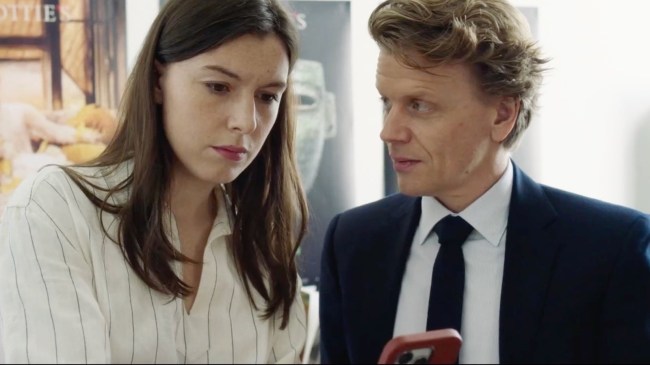

Everything you need to know about Pascal Bonitzer’s tightly knotted “Auction” — a spry and byzantine moral comedy set in the trenches of the French art business — can be inferred from its opening scene. In it, star auctioneer André Masson (Alex Lutz) and his pathological liar of a new intern (Louise Chevillotte as Aurore) pay a visit to a blind old woman who’s eager to unload a priceless masterpiece. Does it matter that she’s mean to her maid? It doesn’t swim. Does it matter that she’s openly racist, or that she’s only selling the painting so that her “tramp” of a daughter won’t stand to inherit it when she dies? Not a chance. André will say, do, and/or forgive anything as long as it allows him to bring the work to market and make his firm a fortune. What a shame that such an exquisite eye for art should only be conditioned to look for profit.
So begins a thoughtful little tempest of a movie that repeatedly circles the questions asked by its first encounter: Where does art belong, who deserves to own it, and how much do we diminish its value by focusing so much on its cost? These are questions that André — unflappable, lupine, faintly resembling a hollowed-out Baryshnikov — has done well for himself by refusing to think about. Here is a guy who so ruthlessly pursues his goal, no matter how bad it makes him look. “Being hated is good for the neurons,” he reasons to Aurore as part of a speech about the need for ruthlessness; later, as the intern angrily complains about her boss on the phone, André bursts into the room as if eager to exult in Aurore’s frustration.
But André, who Bonitzer has named after the early surrealist André-Aimé-René Masson, soon confronts our man with a situation that — at least on some distant subconscious level — forces him to re-evaluate his metrics. A lost Egon Schiele masterpiece from 1914 was discovered in the house of a young chemical worker in a small factory city along the Swiss border. “Wilted Sunflowers,” thought lost during World War II after the Nazis looted it, is authentic in more ways than one: In real life, this very piece was found by an unassuming Frenchman in 2005, who was oblivious to its tainted provenance, and eventually sold at auction for more than $13 million.
A young 79-year-old who wrote screenplays for everyone from Jacques Rivette to Paul Verhoeven after coming up as a critic at Cahiers du Cinéma (and has always enjoyed raising an eyebrow at the bourgeoise), Bonitzer is less interested in the painting itself — about which this film makes almost no comment — than he is in what the painting reveals of the many different people who are drawn into its orbit. For French tradition, Bonitzer emphasizes manners over moralityand so “Auction” uses André as more of a Dantean tour guide through the underworld of the art business than as a typical hero. Which is to say, this isn’t the story of a greedy, materialistic man who suffers a crisis of conscience while trying to pry a priceless treasure away from an uneducated hick who doesn’t know any better.
That isto a degree, exactly what André would like to do, but “Auction” complicates its main character’s trajectory until it doesn’t resemble an arc so much as a chaotic bidding war. While Martin (Arcadi Radeff), the expediently innocent factory worker with the “Wilted Sunflowers” on his wall, doesn’t seem uninterested in his good fortune, everyone else in André’s path has a very fixed idea of who should profit from it. That includes Martin’s friends, who see this as the score of a lifetime, his disarmingly relaxed lawyer (Nora Hamzawi), and the American Jew who claims to represent the rightful heirs of Schiele’s treasure. The situation becomes so messy so fast that André turns to his ex-wife (a playful Léa Drucker as Bertina), of all people, for support; she’s in love with someone new, but also seems to be turned on by the thrill of a lost Schiele falling into her lap.
As if that weren’t enough for this 90-minute film to fit into its frame, Bonitzer takes pains to suggest that Aurore might have her own agenda (it’s honestly hard to tell with her), and that André himself is merely a tool of the auction house where he works. The plot unfolds at the urgent but erratic pace of a life-altering business deal, as Bonitzer unfussily steers us through a series of small rooms as people scramble to determine the proper thing to do with Schiele’s painting. The more they argue over the value of “Wilted Sunflowers,” the more we sense that they are being forced to contend with the value of the argument they’re making. Their own worth, their own purpose, their own provenance.
Rather than key into any particular aspect of what that means, the fast-moving “Auction” — generally sober, but never more than a few degrees removed from tipping into a cheeky satire of its characters’ self-importance — creates an elaborate matrix of buried secrets, invented pasts, and undeniable histories. Complicated enough to lose a casual viewer but never so convoluted that André and co. are sublimated into the system around them (which would have been fatal for a film so attuned to the relationship between personal interest and collective perception), Bonitzer’s plot spins forward at the speed of an auctioneer’s mouth until raw suspense becomes appropriately inextricable from meaningless gibberish.
It’s all good fun, but the movie’s core truth is decidedly unsmiling: If you agree to play the game, you have to abide by its rules. If you let the market decide the price of a ratty old canvas, you have to accept the collective verdict of a thing’s perceived value. Everyone has a role to play. Only Martin — cast as a Dickensian wretch by Bonitzer’s legion of myopic elites, but always quietly acting against type — reserves the right to determine his own worth.
Grade: B
“Auction” is now playing in theaters.
Want to stay up to date on IndieWire’s film reviews and critical thoughts? Subscribe now to our newly launched newsletter, In Review by David Ehrlich, in which our Chief Film Critic and Head Reviews Editor rounds up the best new reviews and streaming picks along with some exclusive musings — all only available to subscribers.
Source link

اترك تعليقاً